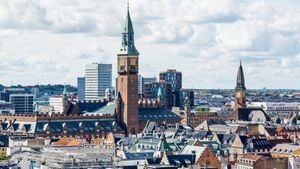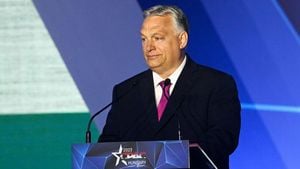After the recent U.S. presidential election, the reactions from European leaders to Donald Trump’s return to political prominence vary widely, showcasing deep divides within the continent. While many leaders approach this new chapter with caution, some express enthusiasm for Trump's agenda.
Most European leaders, including Emmanuel Macron and Pedro Sánchez, appear to be managing their expectations as they strive to establish functional relationships with Trump. For them, accommodating the whims of the newly elected president is key to bridging gaps between the U.S. and Europe, especially concerning economic and foreign affairs.
On the other hand, political figures like Hungarian Prime Minister Viktor Orbán view Trump’s presidency as an opportunity. Orbán, who has rekindled his ties with Trump even before the election, stands out as one of the few European leaders to vocally support Trump's return. His historical stance aligns closely with Trump's populist ideals. According to reports from RBC-Ukraine, Orbán was the only EU leader to openly bet on Trump’s victory, and Trump seems to value this loyalty.
Orbán’s credibility, bolstered by his mediation efforts to resolve the conflict between Ukraine and Russia, places him as more than just a simple ally. His diplomatic initiatives include high-profile meetings with both Trump and leaders from Kyiv and Moscow.
Italian Prime Minister Giorgia Meloni shares similar sentiments toward Trump. Their relationship, cultivated long before Meloni assumed her current role, reflects the practical alliances forming within Europe. Trump remarked to the New York Post after their recent meeting, “I was with her (Meloni) a lot. She's a real live wire, let me tell you. She's great.” Meloni’s administration appears eager to strengthen ties with the U.S. and coordinate on various fronts, making her one of Trump's prominent supporters.
Adding to the mix is Nigel Farage, leader of the Reform UK, who has long maintained ties with Trump, supporting his electoral campaign from overseas. Farage's anti-establishment stance resonates with Trump’s sentiment, positioning him as a significant player within the UK’s political sphere as it pertains to transatlantic relations. With hopes of reclaiming influence, the public persona and focused politics of Farage are now more energizing than ever, with the potential for his party to lead the UK’s opposition forming the basis of speculation about his future ambitions.
While these leaders rally around Trump, there’s considerable tension simmering between Trump and other European leaders, especially with those who have criticized him. European Commission President Ursula von der Leyen encapsulates this challenging relationship. Her tenure has come under fire from Trump, who has consistently expressed disdain for the EU and its policies. Their historical engagement, dating back to her time as Germany's defense minister, features numerous clashes, particularly over defense spending and trade tariffs. The prospect of renewed tariffs on EU imports is anticipated to push the relationship between Trump and von der Leyen to new lows.
On the other end of the spectrum, British Labour Prime Minister Keir Starmer's approach stands distinctly against Trump, having openly supported rivals to Trump. Starmer's past overtures toward Kamala Harris and dismissive remarks about Trump—including calling him “a buffoon” and “tyrant in a wig”—lay bare the antagonistic posture adopted by the Labour Party toward the former president. Although the UK and U.S. share relatively good trade ties, Trump's aversion to Starmer could complicate future interactions.
The current political climate puts Germany’s Chancellor Olaf Scholz in a complicated position. While Scholz has primarily focused on financial stability during his tenure, Trump's penchant for imposition of tariffs threatens key German industries. The potential for early elections adds another layer of uncertainty, as Scholz’s possible successors might reset relations with Washington.
This patchwork of political connections and confrontations shows the intricacies European leaders must navigate as they respond to Trump’s renewed influence. With significant upcoming EU legislative sessions and international summits, how these leaders balance their domestic politics with transatlantic relationships remains to be seen.
Each European leader's relationship with Trump reflects their broader political stakes within their own nations and the EU. While some politicians embrace this new chapter and champion Trump's agenda, others prepare to stand firmly against it. The ramifications of these actions will significantly impact Europe's political climate as they adapt to the shifting U.S. leadership under Trump.



